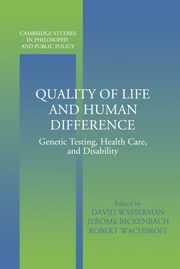Book contents
- Frontmatter
- Contents
- Contributors
- Acknowledgments
- Introduction
- 1 Assessing Quality of Life: Clinical versus Health Policy Uses
- 2 Predicting Genetic Disability while Commodifying Health
- 3 Preventing Genetically Transmitted Disabilities while Respecting Persons with Disabilities
- 4 Disability, Ideology, and Quality of Life: A Bias in Biomedical Ethics
- 5 Values for Health States in QALYs and DALYs: Desirability versus Well-Being and Worth
- 6 Preventing the Existence of People with Disabilities
- 7 Where Is the Sin in Synecdoche? Prenatal Testing and the Parent-Child Relationship
- 8 The Social Context of Individual Choice
- 9 Disability and Health Systems Assessment
- Index
6 - Preventing the Existence of People with Disabilities
Published online by Cambridge University Press: 03 December 2009
- Frontmatter
- Contents
- Contributors
- Acknowledgments
- Introduction
- 1 Assessing Quality of Life: Clinical versus Health Policy Uses
- 2 Predicting Genetic Disability while Commodifying Health
- 3 Preventing Genetically Transmitted Disabilities while Respecting Persons with Disabilities
- 4 Disability, Ideology, and Quality of Life: A Bias in Biomedical Ethics
- 5 Values for Health States in QALYs and DALYs: Desirability versus Well-Being and Worth
- 6 Preventing the Existence of People with Disabilities
- 7 Where Is the Sin in Synecdoche? Prenatal Testing and the Parent-Child Relationship
- 8 The Social Context of Individual Choice
- 9 Disability and Health Systems Assessment
- Index
Summary
WHEN LIFE WOULD BE “WORTH NOT LIVING”
It is commonly held that there are both cases in which there is a strong moral reason not to cause the existence of a disabled person and cases in which, although it would be permissible to cause a disabled person to exist, it would be better not to. Yet many disabled people are affronted by the idea that it is sometimes better to prevent people like themselves from existing, precisely because these people would be disabled. One of their grounds for concern, which will be my particular focus in this chapter, is that claiming that there are reasons to prevent the existence of disabled people may be expressive of a demeaning and hurtful view of the status of existing disabled people, a view that may encourage discriminatory attitudes toward and treatment of the disabled.
I will contend that there can indeed be moral and prudential reasons for preventing the existence of a disabled person. But I will argue that it is less obvious than many people assume what, if anything, the recognition of these reasons expresses about disabled people. And I will contend that, even if the recognition of these reasons does express a perception of disabled people that is potentially hurtful, this effect could be offset by the social expression of a contrary view that I will claim is in fact compatible with, and just as valid as, the potentially hurtful view.
- Type
- Chapter
- Information
- Quality of Life and Human DifferenceGenetic Testing, Health Care, and Disability, pp. 142 - 171Publisher: Cambridge University PressPrint publication year: 2005
- 16
- Cited by



